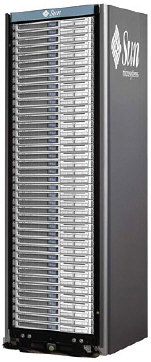Sun's galactic server makeover


Legendary computer designer Andy Bechtolsheim, a Sun co-founder who left the company in1995 and then recently returned, led the development of the Galaxy servers (one of the new systems at left, a Sun Fire X4100). In an News.com interview, Shankland asks Bechtolsheim how Sun's Opeteron servers stand out from the rest of the crowd. He said that Sun worked with AMD on a higher performance version of the dual-core Opteron, which makes Galaxy systems faster than competitors, at least for now. "...with this higher power chip that we have in both the Galaxy boxes, and that we'll support in all our future boxes, we can bridge the performance gap between dual-core and single-core to the point where we now have truly the world's highest throughput 1U and 2U enterprise boxes," Bechtolsheim said.
Graham Lovell, senior director of x64 servers at Sun, told me that the performance gain on the tweaked Opteron is about 11 percent. Versus a four-way Dell PowerEdge, an equivalently configured dual-core Galaxy will deliver 1.5 times the performance at half the price, one-third the power consumption and a quarter of the size, Lovell said. If that's true, Sun has a price/value proposition to crow about in the marketplace...which is far more attractive to customers than just being faster. Let the independent testing begin...
More on Sun's quarterly product announcments tomorrow...